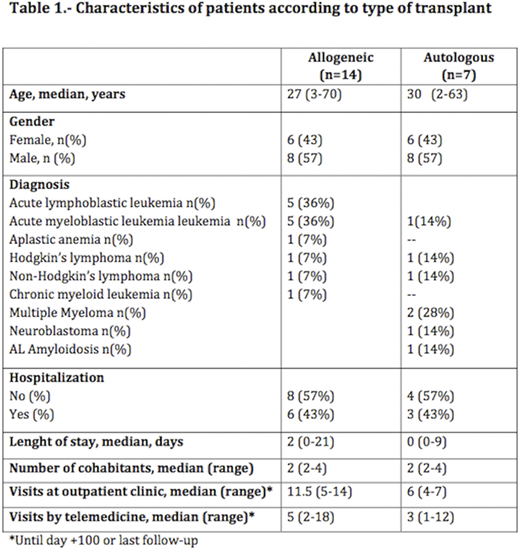Introduction: COVID-19 has transformed stem cell transplantation (HSCT) dynamics throughout the world. Bone Marrow Transplantation units are facing many challenges complicating admission; deferrals in transplant schedules and even temporary closure. Delay in treatment may have a negative impact in outcomes. Outpatient care has been an alternative to hospital care in patients undergoing HSCT since the 1990s. Potential advantages include improved patient independence and satisfaction, improved quality of life, and less hospital resource utilization, which is of particular importance during this epidemic. In this prospective cohort study, we investigated the impact of the pandemic in our outpatient HSCT program.
Objective: To describe the outcomes of patients undergoing ambulatory HSCT during the COVID-19 pandemic.
Methods: Adults and children with any hematological disease undergoing any type of HSCT with an outpatient intent from March to July 2020 were included. All were required to have a Karnofsky score >70%, serum creatinine <2 mg/dL, temporary residence near the hospital, an adequate caregiver, with appropriate educational level and history of treatment adherence. All cases lacked alternative therapies and were discussed thoroughly and approved by our transplant committee. After infusion, patients stayed at home and were seen in the outpatient clinic every other day until hospitalization requirement or engraftment; afterward weekly and bi-weekly through day +100. Patients were instructed to stay at home isolation 14 days before the procedure, and to report the presence of fever, to notify any COVID-19 contact or symptoms including cough, rhinorrhea, conjunctivitis, diarrhea, and anosmia. All patients and caregivers were screened with questionnaires according to the updated COVID-19 case definition. Hand and respiratory hygiene were recommended for donors, receptors, and health workers. Proper personal protective equipment was used according to WHO guidelines. Only a single caregiver was allowed during outpatient visits and hospitalization.
Results: Since the beginning of COVID-19 pandemic in Mexico (February 28th 2020) 21 HSCT have been conducted with ambulatory intent. Fourteen allogeneic (allo-HSCT, 66.6%) (10 haploidentical, 4 matched related donors) and 7 autologous (auto-HSCT) (33.3%%) transplants have been performed. The median age was 27 years (range, 3-70) for allogeneic HSCT and 30 years for autologous (range, 2-63). Acute leukemia (5 lymphoblastic, 5 myeloblastic) was the most common indication for allo-HSCT, and multiple myeloma for auto-HSCT. PCR for SARS-Cov2 was tested only in 1 receptor before the transplant, due to prior test unavailability in asymptomatic persons. Engraftment was achieved in all patients. All received conditioning as outpatients. Twelve (57.4%) were never hospitalized (4/7 auto and 8/14 allo-HSCT) with a median age of 32.5 (range, 16-70). For allo-HSCT median length of stay (LOS) was 2 days (range, 0-21) while for auto-HSCT was 0 days (range, 0-9). The most common reason for hospitalization was febrile neutropenia (n=6, 46%). A median of 7 visits per patient (4-14) were required until day +100 or last follow-up in the outpatient clinic and complemented with 4 (1-18) telemedicine consults. No one died from transplant related mortality. No cases of COVID19 were documented.
Conclusion: Outpatient transplantation is a feasible alternative for performing HSCT during the COVID-19 pandemic minimizing the risk of infection and providing a safe environment for patients, donors, and healthcare providers.
Gomez-Almaguer:Amgen: Membership on an entity's Board of Directors or advisory committees, Speakers Bureau; Novartis: Membership on an entity's Board of Directors or advisory committees, Speakers Bureau; AbbVie: Membership on an entity's Board of Directors or advisory committees, Speakers Bureau; Janssen: Membership on an entity's Board of Directors or advisory committees, Speakers Bureau; Celgene/BMS: Membership on an entity's Board of Directors or advisory committees, Speakers Bureau; AstraZeneca: Membership on an entity's Board of Directors or advisory committees, Speakers Bureau; Pfizer: Membership on an entity's Board of Directors or advisory committees, Speakers Bureau; Roche: Membership on an entity's Board of Directors or advisory committees, Speakers Bureau.
Author notes
Asterisk with author names denotes non-ASH members.


